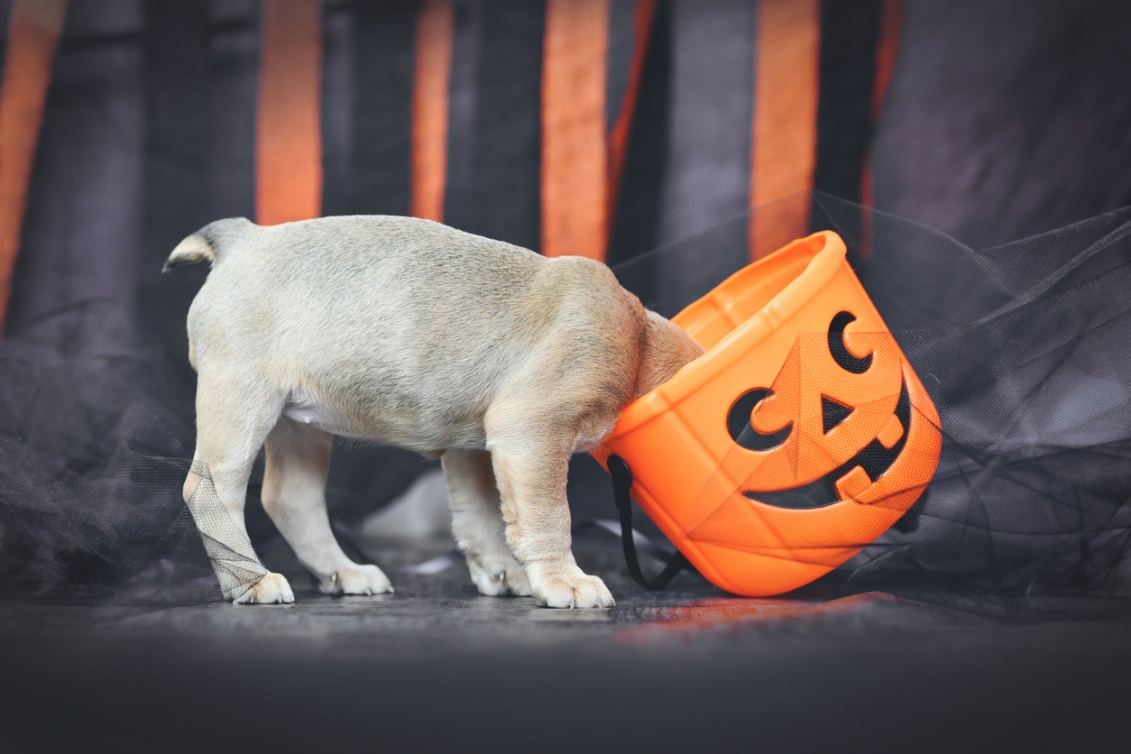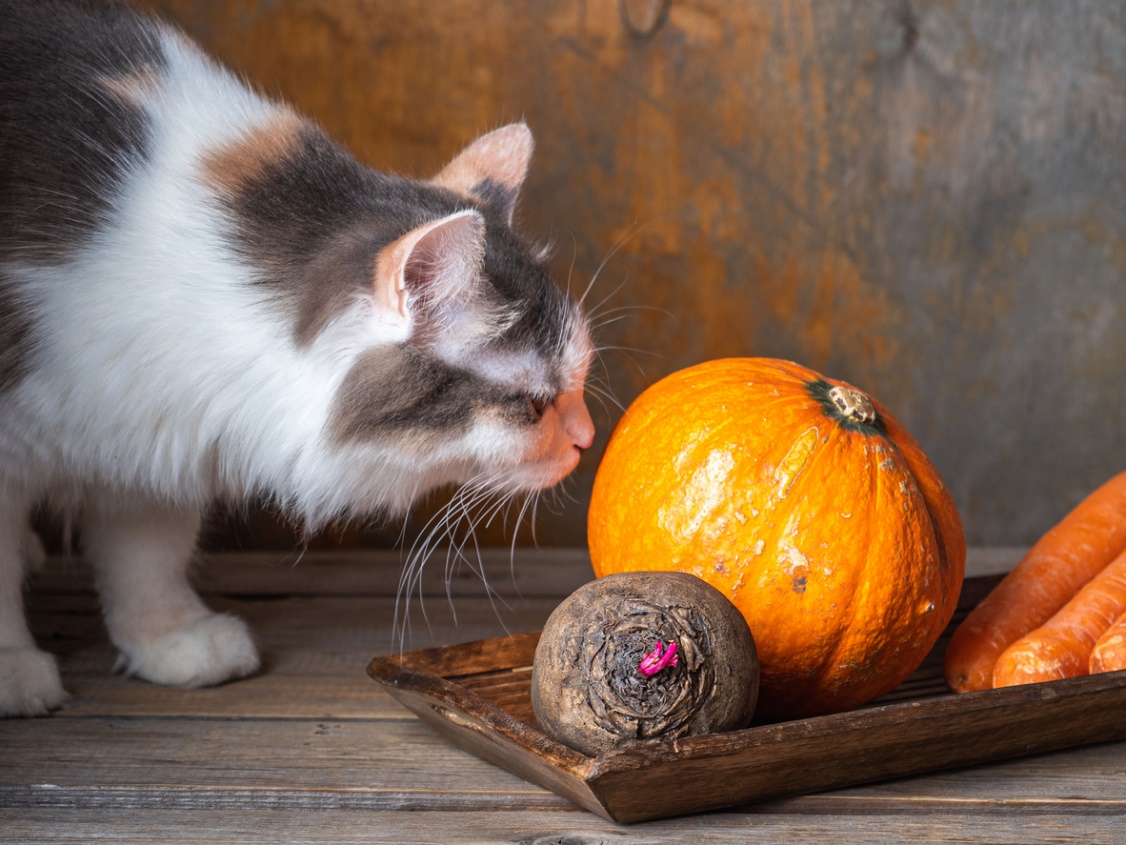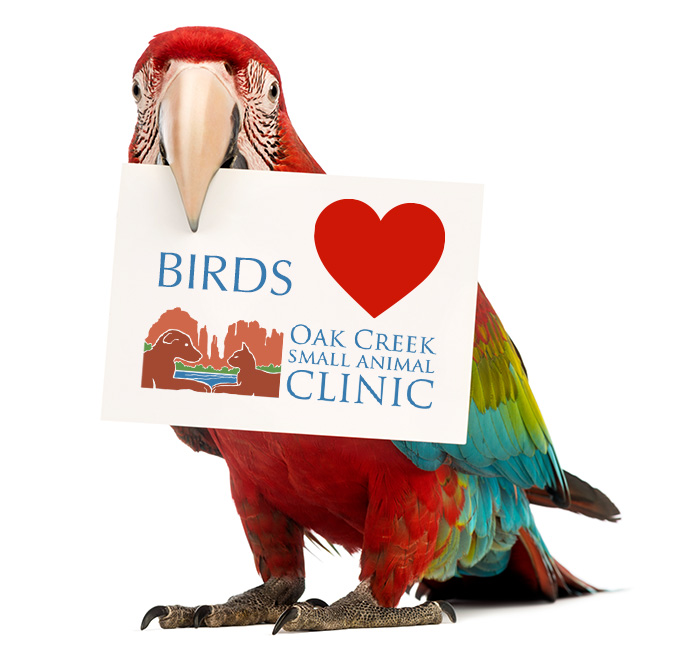Autumn in Sedona means cooler evenings, brilliant red rock views, and more chances to enjoy the outdoors with your pets. But while the season brings beauty, it also introduces risks — some of which can be life-threatening. At Oak Creek Small Animal Clinic, we care for dogs, cats, and exotic pets, and we want you to be prepared with these essential fall pet care tips.
Halloween Pet Safety Tips

Halloween is exciting for people, but it can be dangerous — and sometimes deadly — for pets.
- Keep candy far away from pets – Children often dump and sort their Halloween candy, and that’s when pets are most at risk. Keep pets in another area to prevent accidents and remind kids to not share their candy with pets.
- Chocolate is poisonous to all pets — dogs, cats, rabbits, ferrets, birds, rodents, and reptiles. Even tiny amounts can lead to seizures, heart failure, or death. Below are some examples:
- Dogs: Just one ounce of dark chocolate can poison a 20-lb dog.
- Cats: Half an ounce of baking chocolate may be lethal to a 10-lb cat.
- Ferrets & Rabbits: Even a tiny amount can be fatal.
- Birds & Rodents: Crumbs may cause seizures or cardiac arrest.
- Reptiles: Should never consume chocolate or any human sweets.
- Chocolate is poisonous to all pets — dogs, cats, rabbits, ferrets, birds, rodents, and reptiles. Even tiny amounts can lead to seizures, heart failure, or death. Below are some examples:
- Xylitol poisoning can be fatal
- This sugar substitute, often found in gum, candy, and drinks can cause a sudden and life-threatening drop in blood sugar and liver failure in dogs.
- Ferrets and rabbits can also experience hypoglycemia, seizures, and death.
- For cats, birds, rodents, and reptiles, no safe dose exists — treat it as poison.
- Wrappers and packaging can choke pets or block intestines. Always clean up candy messes right away.
- Choose pet costumes with care — make sure they do not block breathing, movement, or vision. If your pet resists or seems anxious, it’s best to skip the costume.
- Check IDs and microchips. With doors opening for trick-or-treaters, escape risks rise. A microchip dramatically improves the chance of being reunited if your pet slips out. Oak Creek Small Animal Clinic offers safe, quick microchipping services.
- Keep cats indoors. The costumes, noise, and excitement of Halloween night can cause fear, stress, or dangerous escapes.
Is Pumpkin Safe for All Pets?

Pumpkin can be a healthy seasonal treat for many pets, but it is not safe for all species. The form it comes in matters, too:
- Dogs: Offer 1–2 teaspoons daily for small to medium dogs, or up to 2 tablespoons for large dogs. Only give as plain canned pumpkin (no sugar or spices) or cooked flesh.
- Cats: About ½ teaspoon of plain canned or cooked pumpkin mixed into food daily may support digestion.
- Rabbits & Guinea Pigs: Limit to a teaspoon once or twice a week. Use raw pumpkin flesh in very small amounts; too much natural sugar can upset their digestion.
- Birds: Parrots, cockatiels, and similar birds can enjoy small pieces of raw pumpkin flesh or unsalted seeds. Introduce slowly and in moderation.
- Reptiles: Omnivores such as bearded dragons may nibble pumpkin occasionally (raw or cooked). Snakes and carnivorous reptiles should never be offered pumpkin.
- Ferrets: Should not eat pumpkin at all; their digestive systems cannot process fiber.
Pumpkin is naturally high in fiber and low in calories, making it useful for digestion and weight management. Since October is National Pet Obesity Awareness Month, it is also a great time to review your pet’s diet and weight goals with one of our veterinarians.
Tip: Even if pumpkin is safe for your species, always introduce it in very small amounts at first to see how your pet’s body reacts.
Fall Hazards to Avoid
Cooler, damp weather brings its own set of dangers:
- Mushrooms: Many wild mushrooms are deadly, and it is impossible to tell safe from toxic species.
- Garden waste: Corn cobs, pumpkin rinds, and squash hulls can cause dangerous blockages. Moldy leaves and compost piles may harbor harmful bacteria or toxins.
- Poisons: Rodent bait and slug pellets are extremely hazardous. Even “pet-safe” versions can make animals sick.
Supervise outdoor time and leash walks, especially for curious pets and small exotics. If you think your pet has ingested something poisonous, call a poison control hotline immediately — they will advise you on first steps and coordinate care with your veterinarian:
ASPCA Animal Poison Control Center: 888-426-4435
Pet Poison Helpline: 855-764-7661
Quick action can save a life. Keep these numbers saved in your phone so you can reach them without delay in an emergency.
Allergies That Flare in Fall
Ragweed pollen, mold spores, and house dust can all irritate pets. Watch for:
- Itchy skin and paw licking
- Sneezing or watery eyes
- Frequent scratching
- Hot spots or hair loss
If you notice these symptoms, schedule an exam at Oak Creek Small Animal Clinic. Our team can check your pet for skin or ear infections, rule out other issues, and recommend treatments to keep them comfortable throughout the season.
Parasite Prevention: Still a Must in Fall
Do not let the cooler weather fool you — mosquitoes remain active well into autumn and fleas and ticks can infest your pet any time of year in Sedona, Arizona. These pests spread diseases like Lyme disease and heartworm. You should continue year-round treatment, especially in our climate. Missing doses leaves pets vulnerable.
To learn more about heartworm disease, please read our blog: Heartworm Prevention
Rattlesnake Risks: How to Keep Pets Safe
Rattlesnakes are common in Sedona and remain a serious threat to pets well into the fall. As they prepare for winter brumation — a reptile’s version of hibernation — snakes become more active, moving to dens and searching for food. Because evenings cool off quickly in autumn, rattlesnakes are often seen basking in the sun during the day to stay warm, making encounters with pets more likely on trails, in yards, or even around homes.
- Stay on leash – Dogs are most at risk because of their curiosity. Keeping them on a short leash during hikes reduces the chance of a dangerous encounter.
- Avoid tall grass, brush, and rocky areas – Snakes prefer to hide in these spots where they blend in with their surroundings. Stick to clear, open paths.
- Be alert near water sources and sunny spots – Streams, ponds, and warm rocks attract snakes looking for prey or heat as temperatures drop.
- Make your yard less inviting – Clear away brush, tall grass, and woodpiles where snakes may hide. Check fences for gaps, and avoid leaving pet food outdoors, which can attract rodents — a snake’s favorite meal.
- Know the signs of a bite – Sudden swelling, puncture wounds, extreme pain, drooling, or collapse require emergency care.
- Seek immediate veterinary attention – A rattlesnake bite is always an emergency. Call Oak Creek Small Animal Clinic or the nearest veterinary ER right away.
Tip: Ask us about the rattlesnake vaccine for dogs, which may reduce the severity of envenomation. While it is not a guarantee, it can help buy critical time to reach veterinary care.
Seasonal Fun and Enrichment
Autumn is a wonderful time for safe, enriching activities:
- Dogs & Cats: Brisk walks in the cooler weather; leash walks or stroller time for adventurous cats; interactive play indoors or outside.
- Birds: Supervised outdoor time in secure enclosures or travel cages.
- Reptiles: Outdoor basking when temperatures are right.
- Small mammals: Safe leaf piles and chew toys for supervised play.
Remember, Sedona’s trails can be busy in the fall. Always leash pets and carry water, especially for dogs and small mammals.
October is also Adopt-A-Shelter Dog Month — a wonderful chance to give a pet in need a forever home.
Planning Ahead with Pet Insurance
Emergencies happen when you least expect them, especially around the holidays. Pet insurance can help cover both accidents and preventive care, easing the financial stress of an unexpected vet bill. Learn more in our recent post:
Why Get Pet Insurance? Exploring What Coverage Could Mean for Your Pet.
Schedule a Fall Wellness Exam
Fall is the perfect time for a wellness check before the holidays. At Oak Creek Small Animal Clinic we provide:
- Body condition and weight checks
- Vaccines and parasite prevention updates
- Nutrition and lifestyle recommendations
Call us today to schedule your pet’s wellness exam.




